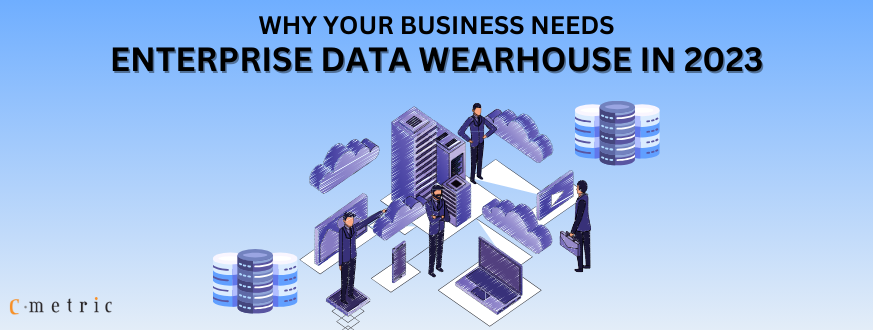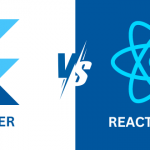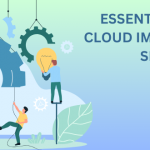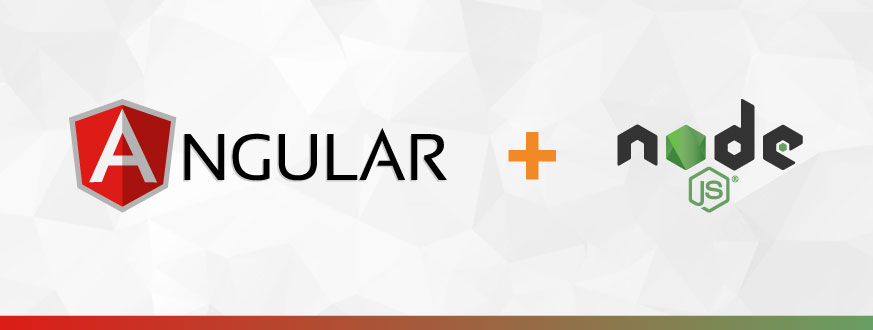Enterprise Data Warehouse (EDW) is a robust database system, either hosted on-premise or in the cloud, designed to centralize and integrate data from diverse sources and applications across the organization. This modern relational data warehouse serves as a pivotal resource for advanced data analytics, delivering actionable insights.
EDWs meticulously collect and aggregate data originating from operational systems such as ERP, CRM, and HR, allowing for comprehensive data structuring and formatting. This empowers teams and employees throughout the organization to access and utilize data efficiently for reporting and analysis. Let’s get started and discover the intriguing business advantages of enterprise data warehousing in 2023.
What’s the Difference Between Data Warehouse & Enterprise Data Warehouse
A Data Warehouse and an Enterprise Data Warehouse (EDW) both serve as data bridging for raw data sources and analytical interfaces. They enable end users to store, transform, and move data. However, the distinction lies in the architectural scope and functionality.
An EDW exhibits broader architectural diversity and functionality compared to a typical data warehouse. Due to its intricate structure and scalability, EDWs are often subdivided into smaller databases, making them more user-friendly for querying.
On the other hand, the technical complexity of a data warehouse isn’t solely determined by size. Factors such as analytical and reporting requirements, the quantity of data models, and the nature of data play an important role. The key difference lies in the comprehensiveness, sophistication, and adaptability of an Enterprise Data Warehouse tailored to large organizations’ diverse needs.
Here’s Why Your Business Needs Enterprise Data Warehouse
Enterprise Data Warehouse holds crucial information that shows the big picture of your organization. Each department may handle data separately without an EDW, leading to potential errors. This scattered data approach is unreliable because there’s a lot of dependency on different data sources. With an EDW, you get a single, organized data storage system that ensures consistent and precise reporting across departments and the whole organization.
Types of Enterprise Data Warehouse (EDW)
Enterprise Data Warehouse has precisely 03 different types you can adopt per your business needs and preferences. Choosing the right one depends on factors like data volume, analytical complexity, security, and budget considerations. Here are three main types of EDWs:
-
On-Premises Data Warehouse:
An on-premises EDW is the traditional variant, with a company’s dedicated hardware and software infrastructure for data storage. Data resides on physical servers, eliminating the need for complex data integration tools between multiple databases. Data is sourced and transformed within the EDW or its staging area, simplifying data management for engineers and streamlining reporting.
When to consider this approach: Ideal for businesses seeking secure data processing and flexibility in architectural styles while also require to maintain data privacy.
-
Virtual Data Warehouse:
A virtual EDW is an alternative to the classic warehouse. It involves connecting multiple databases virtually to enable querying as a single system. Data remains in its source locations but can be accessed through analytical tools. This approach minimizes infrastructure management but still requires transformation software for data usability.
When to consider this approach: Suitable for businesses with manageable, standardized data that don’t need extensive analytics or BI integration.
-
Cloud Data Warehouse:
A cloud data warehouse is a central repository hosted in the cloud, offered as a managed service by a cloud provider. It’s optimized for analytics, scalability, and usability. Cloud warehouses consist of compute, storage, and client layers. The infrastructure is maintained by the cloud provider, eliminating the need to set up servers and databases.
When to consider this approach: Ideal for organizations of any size that require a hassle-free setup, including managed data integration, warehouse maintenance, and BI support, and are comfortable with cloud-based data storage.
You Might Read This
Things to Consider When Choosing the Right Tech Partner for Startup
The Benefits of Enterprise Data Warehouse
Enterprise Data Warehouses deliver a range of valuable advantages that can significantly boost organizational efficiency, like the following:
Streamlined Data Management
EDWs centralize and standardize data from diverse sources, eliminating data inconsistencies. This unified dataset simplifies data processing and saves considerable time that would otherwise be spent on manual data aggregation.
Enhanced Collaboration Across Departments
By providing a comprehensive view of an organization’s operations, EDWs facilitate cross-functional collaboration. For instance, in an eCommerce setting, marketing and sales teams can leverage a shared EDW to analyze customer journeys jointly, optimizing the path from discovery to conversion through collaborative data exploration.
Swift Access to Actionable Insights
A well-structured EDW empowers data analysts and business teams to extract valuable insights from the entire dataset quickly. This eliminates the need for laborious data queries, granting immediate access to a trusted source of information that expedites decision-making.
Democratized Data Access
EDW software simplifies data insights, making them accessible to non-technical marketing, finance, and HR teams. This enables these teams to spot trends, set relevant KPIs, and make informed decisions, fostering a data-driven organizational culture.
Robust Data Security and Disaster Recovery
Many cloud-based EDWs offer robust data security features and disaster recovery mechanisms. Automatic data duplication and backups minimize the risk of data loss, while the scalability of cloud systems enables organizations to tailor resources to their evolving needs.
Features of Enterprise Data Warehouse
The Enterprise Data Warehouse (EDW) offers several distinct features that contribute to enhanced data management and decision-making:
Integrated Data Management
EDW achieves data integration by unifying data from diverse sources into a standardized format, enabling seamless data analysis. This integration ensures a consistent approach to data nomenclature and layout, simplifying the analysis of extensive datasets.
Non-Volatile Data Storage
EDW maintains a non-volatile nature, preserving historical data without the risk of erasure. This read-only data is only updated periodically, facilitating statistical analysis and providing insights into the timing and evolution of events. Complex procedures for data retention become unnecessary.
Subject-Oriented Information
EDW focuses on specific subjects or topics, such as sales, inventory, or supply chain, unlike operational databases. This subject-oriented approach allows for in-depth analysis and a clearer understanding of particular aspects of the business.
Persistent Historical Data
Historical data remains intact within the EDW even as new data is added, ensuring persistence and non-volatility. This historical repository is invaluable for conducting analogies, identifying patterns, performing predictive analyses, and facilitating informed decision-making.
Enterprise Data Warehousing Cost Considerations
Hardware and Software
Initial hardware and software infrastructure investments, including servers, storage, and database licenses, are significant cost factors.
Data Integration
Costs associated with data integration tools, ETL (Extract, Transform, Load) processes, and data cleansing are essential considerations.
Maintenance and Support
Ongoing system maintenance, software updates, and technical support expenses are crucial for uninterrupted operations.
Scalability
The ability to scale the EDW as data volumes grow is vital, with expansion costs to be assessed.
Cloud vs. On-Premises
Choosing between cloud-based and on-premises solutions entails varying cost structures and should align with organizational goals.
How C-Metric Can Assist You With Enterprise Data Warehousing
C-Metric specializes in navigating Enterprise Data Warehouse (EDW)for all the shapes and sizes of businesses, ensuring alignment with your strategic business goals. Our EDW services encompass:
- Thorough requirement analysis
- Strategic design implementation
- Configuration and development
- Effective data management processes
- User training
- Ongoing EDW support and maintenance
Our expertise empowers your business with a competitive edge, enhancing performance across all fronts. Our advanced Data Analytics capabilities and offerings ensure that your data is secure and adaptable in any market environment. Trust our comprehensive EDW consulting and implementation services to get customized solutions to drive your business to success.














